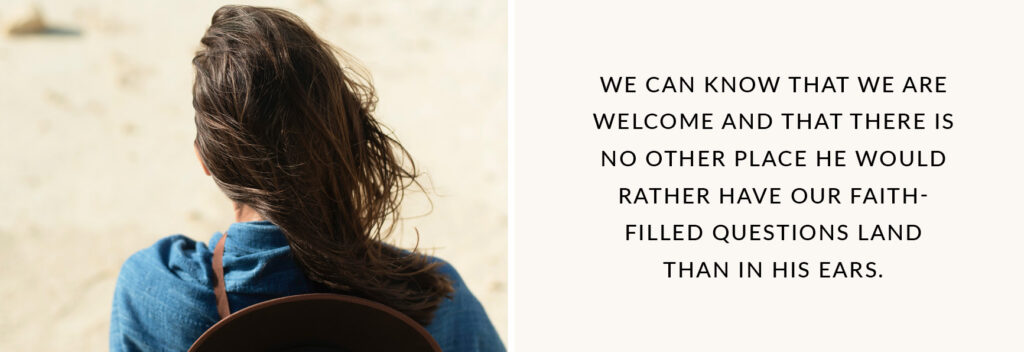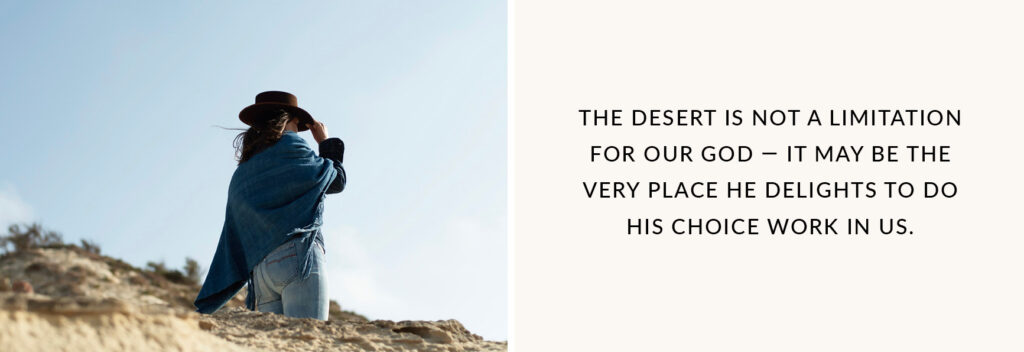Leaning In and Letting God Lead You Through
By MANDY SAELER

Late into the night over cups of tea going cold, I heard her story and surveyed the landscape of her life from the outside listening in. My mind reeled and my heart ached as her words landed in my ears. There were problems I couldn’t fix; solutions I couldn’t provide. She was in a desert season — and I couldn’t change that.
As she shared, my heart was welling up with truth. With spiritual eyes, I caught a vision of the possible growth, strength, and blessing God had for her through this season. And I saw the blossoms of life and hope His Word held for her while she was yet in this desert place. While I sought to encourage my friend that night, I did not hold the power to bring the breakthrough or convince her of the spiritual realities that I saw. I prayed with her then and continue to pray now — for blooms in the desert by day and a sky pinpricked with stars by night — because I am convinced that no matter how dry, our deserts can become places that host the masterful working and wonders of God’s own hand.
DEFINING THE DESERT
A desert season isn’t a place we naturally want to be or choose to be, but it’s a place we find ourselves from time to time in our spiritual journey. Deserts of heartache, loneliness, waiting, loss, or unyielding challenge. These places are dry — whether that dryness be spiritual, emotional, practical, financial, relational, or something else. And with that dryness can come a sense of desolation and emptiness, whether from a lack of what once was present or a lack of what we hope will be. The desert is a place of suffering, a place of unanswered questions, a place to practice obedience, and is always a place of heavenly refining if our hearts are open to God.
ON ASKING GOD, “WHY?”
When you feel that you’ve been painted into a desert landscape where questions linger in the dry air and the parched ground aimlessly sprawls as far as your eyes can see — it can be challenging to grapple with why God has set you in this place, what His purposes are, and where He is leading. It can feel indiscernible at times.
Perhaps you, like me, have heard people (almost superstitiously) say, “You should never question God and ask why.” It would seem as though asking God why is to challenge the Almighty, irreverence His wisdom, and foster rebellion in our hearts. However, when I picked up a slim volume called On Asking God Why: Trusting God in a Twisted World by Elisabeth Elliot, her presentation of truth impacted my perspective on asking God that infamous question:
There are those who insist that it is a very bad thing to question God. To them, “Why?” is a rude question. That depends, I believe, on whether it is an honest search, in faith, for His meaning, or whether it is a challenge of unbelief and rebellion. The psalmist often questioned God, and so did Job. God did not answer the questions, but He answered the man — with the mystery of himself. […] He has not left us entirely in the dark. We know a great deal more about His purposes than poor old Job did, yet Job trusted Him. He is not only the Almighty — Job’s favorite name for Him. He is also our Father, and what a father does is not by any means always understood by the child. If he loves the child, however, the child trusts him. It is the child’s ultimate good that the father has in mind.
It was then that I realized the beauty of a humble and yielded heart that leans into the Father and desires to be led as we ask, “Why?”
We can approach our God with the aching questions in our heart. We can express the tangles in our mind, our unclear vision, our grappling with the hardships of the desert. We can know that we are welcome and that there is no other place He would rather have our faith-filled questions land than in His ears.

When you are trusted to trust
What challenges has God entrusted to you in this season? Are you bearing them up on your own shoulders, with your own strength and determination? Or are your hope and strength sourced in Him as you withstand these things one day at a time?
At times we may begin to lean on our own understanding, or our grip on the sword of truth loosens ever so slightly, or our heart becomes tinged with weariness. It is then that we can be tempted to question why from a heart on the cusp of hurt, offense, or even bitterness toward God. On the edge of this dangerous territory, Amy Carmichael exhorts us with truth to trust God’s ways, even when they are perplexing to us. “Let us turn all our puzzles, all our temptations to wonder why, into opportunities to receive the blessing of the unoffended … the one thing that matters now is how [we live] through those days when [our] faith is tried to the uttermost … all that matters is how we live through these days while we are trusted to trust.”
When we consider that God is trusting us to trust Him in the middle of things that don’t make sense, it can radically alter how we live through those times. Although the hardships we face will still be painful, we can know that we are seen by God and all that we are facing has been sifted through His hands. With a heart that is tender towards God, we can receive the blessing of being trusted to trust, rather than being offended and embittered by things we don’t understand.
Dietrich Bonhoeffer expressed the mysterious working of God with these hope-filled words, “Only the humble believe Him and rejoice that God is so free and so marvelous that He does wonders where people despair, that He takes what is little and lowly and makes it marvelous. … [He] performs His wonders where one would least expect them.”
Will you and I be counted among those who harbor a softness of heart that rejoices in the redemptive wonders God works in the desert?

Enduring with God
The most important thing is to endure the desert with God, which necessitates intentionality and an almost-continual exertion of soul. Exertion can feel like the hardest thing in our hardest places. And yet it is in the hardest places that it is more essential than ever to not be led by mere feeling, as everything eternally worthwhile requires exertion. Faith requires exertion. Spiritual vigilance requires exertion. Prayer, being spiritually offensive, opening the Word, and embracing His promises all require exertion.
We can only carry on with strength as we “…see ‘Him who is invisible,’ that is, as we look away from the trial to the Lord. This is what Moses did, and so he was able to endure. ‘Where there is no vision, the people perish.’ If we see only the things of time and forget the things of eternity, we perish; our faith withers and we become weak and hopeless. We need vision for life, vision for prayer — continual undimmed vision — if we are to be those on whom our God can count for anything, any time, anywhere.”4
Let us remember that how we live and walk these days matters. How we choose to exert our faith when our feelings are shallow matters. Friend, these days carry weight and yet this desert burgeons with heavenly purpose. Enduring with God through the most challenging seasons of our lives is the very crux of our strength, vision, hope, and sustenance.
He is always good
Your desert may feel lonely and lacking in meaning. You may wonder how such a barren place could yield any purpose at all. And yet, there is nothing further from the truth as God is working in ways you cannot see. Take to heart the words of David: “I would have lost heart, unless I had believed that I would see the goodness of the Lord in the land of the living. Wait on the Lord, be of good courage, and He will strengthen your heart. Wait, I say, on the Lord” (Ps. 27:13–14).
Believe that you will see His goodness; trust and act knowing that you will see His goodness. As you do so, remember that your belief doesn’t hinge on your own willpower — your belief hinges upon the faithfulness of the God who is who He says He is and will never fail you. Your confidence in God’s prevailing goodness will be a buoy of courage amid the waiting.
There is a beautiful song entitled “Always Good” wherein Andrew Peterson sings about the reality that God is always good, and how He uses sorrow to shape our hearts and draw us close to His heart in ways that joy never could.* He sings about how it can be hard to see what God is doing in the midst of our pain. And while there are things that we won’t understand, what we can comprehend is that His intentions for us are good. He proved this by displaying His love poured out for us, in our place, on the Cross. Always and ever, He is good.
In a blog post that shares the story behind the song, the writer shares about his friend’s resolve to proclaim and cling to the goodness of God as he found himself unexpectedly thrust into an aching desert. He writes, “Last year a good friend of mine lost his wife just hours after she gave birth to their first child. My sons were at the hospital when he went into the room to see her body before they took it away. He saw her and cried out in agony, ‘Always good! Always good! God is always good.’ It was a cry that came from a place of profound faith, as if he were trying to convince himself, and yet the words were utterly true — even in the face of unimaginable pain.”5
May our faith be compelled by this man’s story, and may our hearts hold to that same proclamation all throughout the desert when we are trusted to trust, “Always good! Always good! God is always good.”
conclusion
Even in the midst of the mystery that shrouds our desert places, we can look to the faithful testimony of God throughout the ages and take heart: His love for us endures, His ways are trustworthy, and His redemption always has the upper hand. The desert is not a limitation for our God — it may be the very place He delights to do His choice work in us.
Remember, the God who brings flowers to bloom in the desert and bright stars to glisten in the night sky is the same God who holds charge over your portion and over mine. This desert season won’t last forever. Change may dawn and your desert season dissolve this very day … but what will last forever is the Word of God that took root and flourished in your heart and the likeness of Christ that was formed in you. Lean in, and let Him lead you through.

This article was originally published in Issue 47.
For more content, explore our article collection.